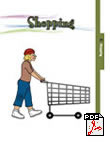- TOOL KITS
- A. The NEXT Step
- B. Promoting Independence
- C. Phone Apps
- D. Return to Work
- E. Motivational Interviewing
- F. Paediatric Brain Injury Rehabilitation Resources
- a) Introduction
- 0. Introduction
- 1. Transition
- 2. The transition wheel
- 3. Walking around the transition wheel
- 4. The transition wheel interview
- 5 . Using this kit
- 6 . Web resources
- b) Working together
- 7. My role
- 8 . My family's role
- 9. My case manager's role
- c) What can I do?
- 10. Who, where, what? The Services I receive
- 11. Accommodation
- 12. Driving
- 13.Alcohol and drugs
- 14. Social and recreational activities
- 15. Health and well-being
- 16. Relationships and friendships
- 17. Sexuality
- 18. Personal safety
- 19. Complaints/rights
- 20. Legal issues
- 21. Centrelink
- 22. Financial
- 23. Shopping
- 24. Employment, training and tertiary education
23. Shopping
Good shopping habits are important to save money and time.
Plan ahead:
Plan your meals ahead, for a week if possible, and make out a shopping list for each week’s menu. Keep the list in an easy to see place and add to this list other items as you run out of them. By doing this you will save because you will have fewer trips to the shops and because last minute and impulse food purchases are seldom cheap.
A shopping list is the best way to avoid spur of the moment impulse purchases. Your menu should be flexible enough to make use of leftovers and to take advantage of food specials.
Hints for economical grocery shopping.
- Planning is important, make a shopping list and stick to it.
- Take the amount of money with you that you can afford, do not take all of your money.
- Spend most of your money on food that is nutritional. Avoid buying food that is high in fat, sugar or salt.
- Buy fresh fruit and vegies that are in season. Make sure they are of good quality by buying fruit and vegies that look fresh and are firm and not wilted or shrivelled.
- Keep expenditure on alcohol to a minimum.
- Find out about specials and low cost seasonal foods by looking at the supermarket flyers and ads in the paper or on the TV.
- Buy canned items in bulk when they are on special, if you can store them.
- Compare prices of different brands of grocery items. Often ‘home brands’ or supermarket brands are cheaper and of similar quality.
- Compare the cost of different package sizes. Larger sizes often only cost a little more so try to buy in bulk where possible but remember that it is only economical if you actually use it.
- Traveling all over the town/city to chase specials is not economical.
- Check the used by date on the package.
- Pay attention to the scanning at the checkout. Sometimes they make mistakes.
- Do not go shopping when you are hungry, go after you have eaten, then you will not be tempted to buy too much.
- Do not take small children with you when you go shopping as they can tempt you to buy things that are not on your list.
- Take a calculator with you so you can keep track of your spending.
- Shopping should be done only once a week or once a fortnight.
Always stop and think before you buy something.
Ask yourself, “am I buying this for a good price and can I afford this?”
Other useful tools
Use Toolkit B Promoting Independence. See especially Section 14 Food and shopping


